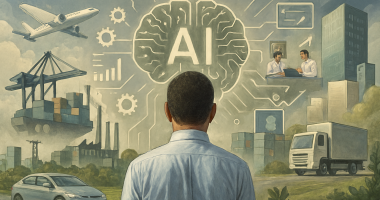In the latest episode of Contributors Corner, hosts Lyndsay Malchuk and Michael Succurro, alongside guest Neel Singh, dove into one of the most transformative forces reshaping industries today: artificial intelligence. As AI continues its relentless expansion, investors and businesses alike are racing to decipher its true potential beyond the media-fueled hype.
AI Startups: Innovation or Just Noise?
From Elon Musk’s dramatic threats to withdraw billions from OpenAI to the emergence of DeepSeek as a cost-effective alternative to ChatGPT, the AI sector is experiencing a whirlwind of competition and speculation. But as Singh pointed out, many so-called AI startups are mere “wrappers”—building on existing large language models (LLMs) like OpenAI’s ChatGPT or Google’s Gemini without adding real differentiation. These companies attract investment but lack the proprietary data and expertise required for long-term sustainability.
The real winners, Singh suggests, will be those that integrate AI into established industries like fintech, supply chain management, and healthcare. AI itself is not an industry—it’s a foundational technology permeating all sectors, much like the internet before it.
The Capital Conundrum: Can AI Startups Turn a Profit?
A major challenge facing AI firms is the high cost of operation. The processing power needed to run advanced AI models is staggering—ChatGPT, for instance, reportedly costs $100 million to operate annually. Some startups claim they can run similar models for a fraction of the cost, but as Succurro noted, sustainability is key. Are these companies relying solely on venture capital burn rates, or do they have a viable path to profitability?
Subscription models, enterprise licensing, and AI-as-a-service models are emerging as potential revenue streams, but investors must scrutinize each company’s financials to determine if they can survive beyond the hype cycle.
Cybersecurity & AI: A Growing Battlefield
As AI adoption accelerates, cybersecurity threats are escalating in tandem. The ability to replicate voices, forge identities, and manipulate digital assets with AI-driven deepfakes is a growing concern. Singh foresees a surge in AI-powered identity management and rights protection, possibly leveraging blockchain technology to ensure authenticity and traceability.
For businesses, the risks extend beyond external threats. With employees increasingly relying on AI for tasks like drafting emails or analyzing financial data, there’s a risk of sensitive company information being fed into public LLMs, raising significant data security issues.
The Energy Dilemma: Can AI Sustain Its Own Growth?
The AI boom is not just about software—it’s creating ripple effects across infrastructure and energy markets. Training AI models consumes enormous amounts of power. According to Singh, ChatGPT alone generates a power demand equivalent to tens of thousands of homes annually, with each query consuming ten times the energy of a standard Google search.
Governments and corporations are responding with massive investments in data centers, power grids, and even nuclear energy to keep up with demand. As Succurro highlighted, the infrastructure required to support AI is lagging behind its growth—a challenge reminiscent of early Bitcoin mining and electric vehicle adoption.
Investment Outlook: Betting on AI’s Support Systems
Investors looking beyond the obvious AI stocks like Nvidia and Microsoft should consider adjacent sectors poised for growth. Cybersecurity firms, renewable energy providers, semiconductor manufacturers, and cloud infrastructure companies are all critical to AI’s expansion.
“AI is here to stay,” Succurro concluded, emphasizing that investors should not only look at AI companies but also at the industries that enable AI to function. The next wave of investment may not be in AI models themselves, but in the foundational systems—power, security, logistics—that AI depends on.
Final Thoughts
The AI revolution is still in its early innings, but as Lyndsay pointed out, while AI can enhance efficiency, human expertise remains irreplaceable. Whether in finance, media, or healthcare, AI should be viewed as an augmentation tool rather than a replacement for human decision-making.
As the market continues to evolve, investors must balance optimism with due diligence, separating real innovation from speculative noise. The companies that emerge as long-term winners will be those that not only leverage AI effectively but also address the infrastructure, security, and energy challenges that come with it.
For those looking to capitalize on the boom, the key takeaway is clear: look beyond the headlines and focus on sustainable business models that drive real-world value.
Check out previous conversations with Michael Succurro and Lyndsay Malchuk about crypto education, navigating political uncertainty with investments, and more
To stay up-to-date on all the market news, head to Stockhouse.com
Join the discussion: To join the conversation head to our Bullboard investor discussion forums and the rest of Stockhouse’s stock forums and message boards.
As always, these conversations are packed full of useful knowledge for your portfolio decisions. Remember these are the opinions of our own, with vested interests in particular assets and companies. Always be sure you speak with your Financial Advisor and know your own risk tolerances. For full disclaimer information, please click here.



